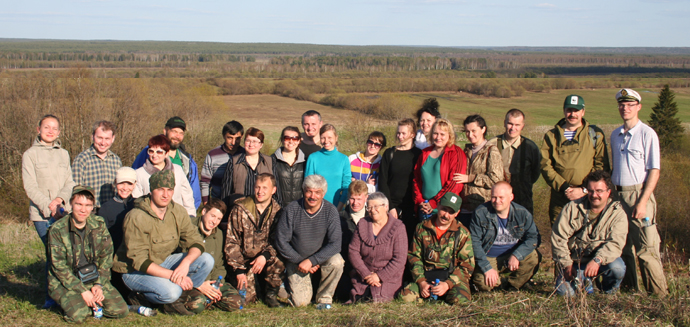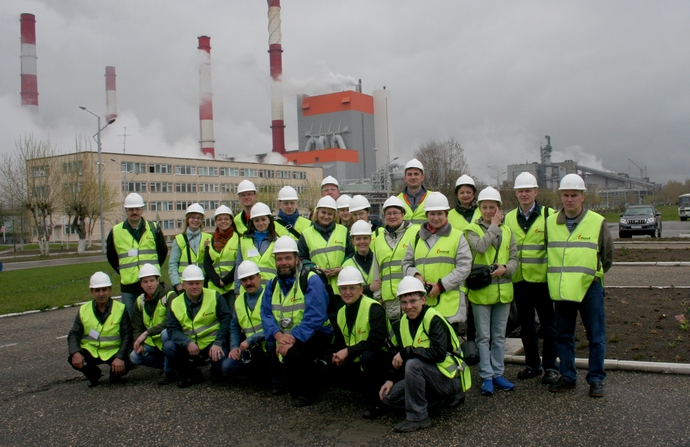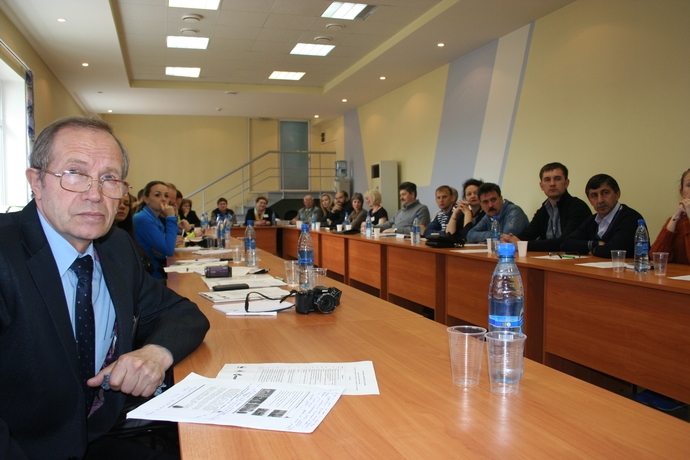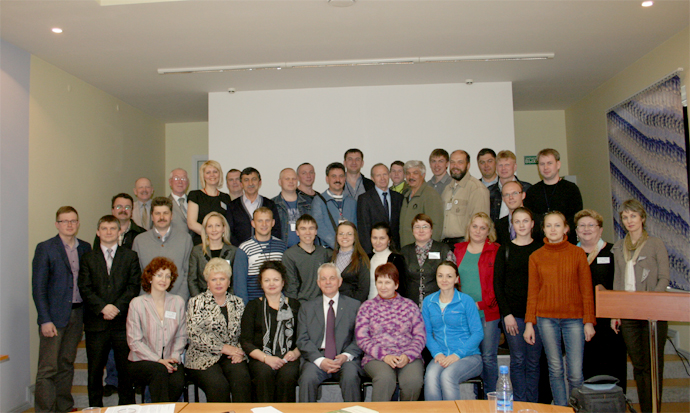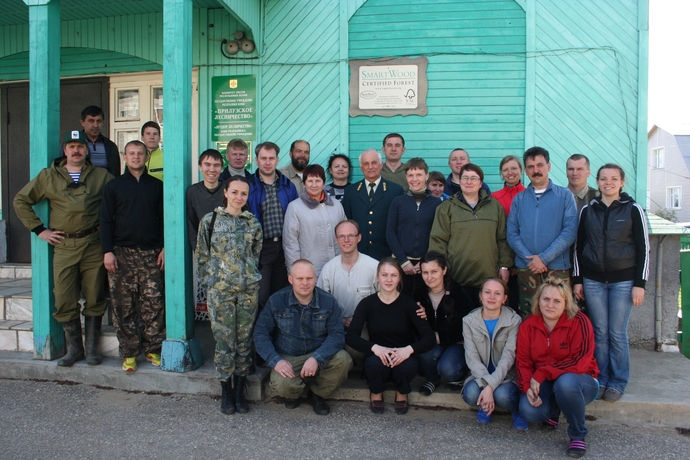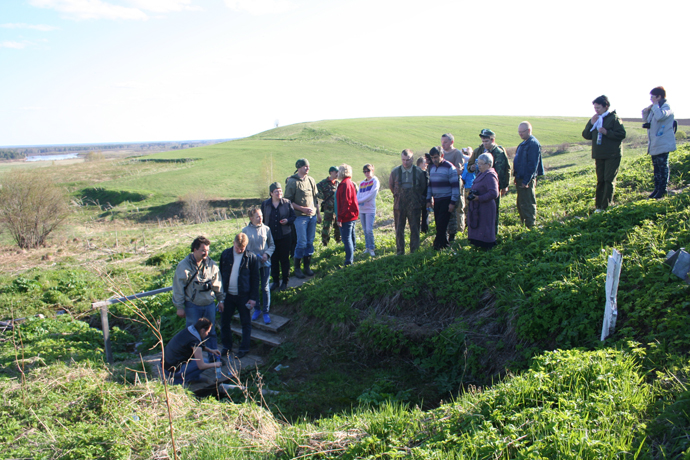The teachers from Russian forest universities praised the experience of sustainable forest management in the Komi Republic
Russian modern forestry has some vexed problems – from the imperfections of the forest legislation and immature market relations to the depletion of forest resources and low efficiency to deal with forest fires. Obviously, it’s impossible to solve all forest issues quickly; the buildup of sustainable forestry in Russia will take years. One of the basic conditions for changing the current situation is the availability of qualified forest specialists. Aware of this, WWF Russia organizes seminars “Best practices for sustainable forest management” for teachers from Russian forest universities for the third time. According to WWF, the Republic of Komi has the same experience as Pskov Model Forest and Finland.
23 people from different parts of Russia – Dagestan, Ussuriysk, Arkhangelsk, Vologda, Krasnoyarsk and many others – were selected to participate in the meeting competitively. The organizers of the seminar had a difficult task to show the Komi forestry from various sides during a several days period in a way so that each participant could introduce the knowledge in their university background.
Acquaintance with the Komi forest industry started with a trip to the largest industrial enterprise -Mondi Group (Mondi Syktyvkar, OJSC). Employees of the “Giant on the Vychegda” showed hospitality and organized a tour for the participants; they showed almost the entire production cycle – from wood arrival to the company to manufacturing and packaging of the main product – office paper. Many participants acknowledged that they had seen such production volumes for the first time; they say it is amazing that this large timber business is so open to interested parties.
The delegates investigated thoroughly the work of the Mondi forest department. Vasily Chuprov, Deputy Head of the department, and Denis Popov, certification team leader, described to them the ins and outs of the logging planning system, as well as how the company carries out the such requirements of the voluntary forest certification according to the FSC system as preservation of high conservation value forests and key biotopes.
Many teachers were interested in how the company chooses employees. After all, the modern specialist must have several skills – from the ability to work with modern equipment to the knowledge of sustainable forest management. Olga Nikiforova, Head of the MondiTraining Center, said they have been having the Komi Forest Academy project for several years in which great attention is paid to the retraining and advanced training of the existing staff and cooperation with students of the Syktyvkar Forest Institute.
By the way the next day during the trip to the Institute the participants were convinced that the cooperation of Mondi Group with the Syktyvkar Forest Institute is stable. There they saw modern laboratories established with the support of Mondi and were able to communicate with the students who prepared the exhibition and showed their scientific projects within the Komi Forest Academy. Pavel Azarenkov, Deputy Head of the Forest Committee, and Alexander Gibezh, Deputy Minister of Industry and Transport, made a report “The intensification of forestry and forest management as a factor in the development of the regional timber industry.”
The main part of the seminar was held in the Komi Model Forest. Specialists from the Silver Taiga Foundation showed major routes and experimental demonstration polygons in the Komi Model Forest, reported about the history of forest management in the Republic of Komi, pointed out areas of untouched boreal forests belonging to different types of natural forest dynamics. The teachers and students saw the examples of different types of cuttings and their long term effects. All participants praised how compact and meaningful the trails are.
“Most of all I liked the tour by various routes”, said Peter Melnik, Associate Professor of Forestry ofthe Moscow State Forest University. “Special thanks and acknowledgment to Yuri Pautov for his answering our questions professionally and in the way that he could keep us interested.”
During the field trip Paul Bezverkhov, Head of Alternative Forest from St. Petersburg and an expert of intensive forestry, jointed the group. Together with the teachers he visited different types of cutting plots, young trees, and middle-aged stands, where everybody could assess the possibility of intensive forest growing in these areas.
A meeting with Alexander Kindsfater, Director of Priluzje forestry unit, and Pavel Azarenkov, representative of the Komi Forests Committee, was especially rememberable for the participants. They had been answering questions about different areas of forest management for nearly two hours. So, other regions have something to borrow from the Komi Republic. Among these positive moments like true partnership and interaction of various forest stakeholders they can take over the experience of isolation of forest areas for the local population needs.
In the evenings the delegates got together in the meeting room where they exchanged their impressions and opinions about what they had seen. Of course, there were some disputes. For example, one evening they began a lively debate about the pros and cons of the transfer of forests to private ownership.
The field seminar showed the readiness and willingness of teachers to get new knowledge and share experiences. All participants unequivocally admitted that there is a lot of practical benefit from the knowledge obtainedduring the workshop. Everyone took something interesting for themselves, someone learned the technique of creating ecological routes, or ways to create a herbarium reflecting different types of ecosystems, or the use of GIS technology. All the participants agreed that such projects as Komi Model Forest should be created in all regions training forestry experts. There is no doubt that the established friendly relations will be maintained. The teachers promised to transfer their knowledge to students – the future foresters. Because the future of the Russian forest sector depends on them.
Mondi tour
Discussion in the Syktyvkar Forest Institute
Participants of the trip with Pavel Azarenkov, Alexander Gibezh and representatives of the Syktyvkar Forest Institute
Teachers and students from Russian forest universities & Alexander Kindsfater
У святого источника в селе Ыб

